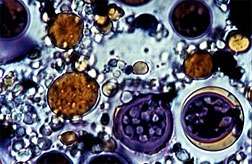Research reveals potential for producing liquid fuels using microalgae

(Phys.org)—Due to continuing high demand, depletion of non-renewable resources and increasing concerns about climate change, fossil fuel-derived transportation fuels face constant challenges from both a world market and an environmental perspective. Producing renewable transportation fuel from microalgae attracts much attention because of its potential for fast growth rates, high oil content, ability to grow in unconventional scenarios, and its inherent carbon neutrality.
Microalgae are microscopic, single-cell organisms that exist in fresh water and marine environments and also at the bottom of the food chain. Under optimal conditions, microalgae can be grown in massive, almost limitless, amounts. Almost half of microalgae's weight is lipid oil. Scientists have been studying this oil for decades to convert it into biodiesel – a fuel that burns cleaner and more efficiently than petroleum. Moreover, the use of microalgae would minimize "food versus fuel" concerns associated with several biomass strategies, as microalgae do not compete with food crops in the food chain.
Recent research conducted at DOE's National Energy Technology Laboratory on transportation fuels production using microalgae provides a more fundamental understanding of catalyst selection and conversion processes using computational modeling.
This research shows the potential of various thermocatalytic pathways to produce alternative transportation fuels from algae and identifies key areas where computational modeling should be directed to optimize the process. A recent article was published about this study in RSC Advances.
Provided by US Department of Energy


















